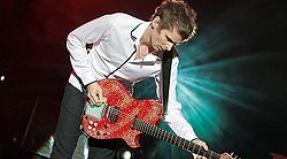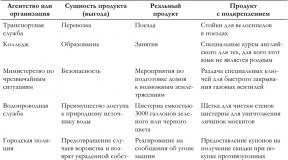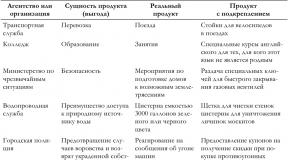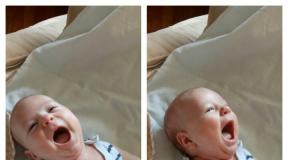Why does a person look away when talking. Reasons for not wanting eye contact. Heavy unpleasant look of the interlocutor
Psychologists say that a person who hides his eyes or looks away in dialogue can be either a very shy person or a liar. And the truth is that the one who has "darting eyes" gives the impression of a not too decent person. But people often do not like to look eye to eye, and this is not associated with thoughts of stealing or cheating something. Why do we look away? Do liars make eye contact? Modern science has its own answers to these and other questions.
Eyes are the mirror of the soul
Experts at the University of California are convinced that the quality of communication is 93% determined by non-verbal means. Body language, tonality, timbre of the voice and, of course, the expression in the eyes - all this helps to understand what a person really wants to say.
Other figures are given in a study led by Steven Janick and Rodney Wellens of the University of Miami in Florida: 44% of attention during communication is focused on the eyes and only 12% on the mouth. It is the eyes that are the "litmus test" of our emotions: they reflect fear, disappointment, bitterness, joy ... But why then do we so often avert our eyes?
Trying to focus
Psychologists Fiona Phelps and Gwyneth Doherty Sneddon in their work "Look-disgust" tried to determine the dependence of the length of the gaze on the method of obtaining information and the level of its complexity. They conducted an experiment in which two groups of 8-year-old children were asked easy and difficult questions, the former receiving information on a face-to-face basis, and the latter through a video monitor.

It turned out that the more difficult the question was, the more often the child averted his eyes in an attempt to concentrate and find the answer. Interestingly, a similar situation was observed more often in groups where the dialogue was built face to face.
Liar? Liar!
There is a persistent stereotype that during a lie, a person is unable to look the other person in the eye. However, British psychologists from the University of Portsmouth are confident that everything is exactly the opposite.

The liar wants to make sure that his "noodles" are firmly settled on your ears, so he continuously monitors your emotions, staring intently into your eyes. But is this behavior effective?
Power of persuasion
Sometimes liars act like this: knowing that the interlocutor will be unpleasantly surprised by a shifting gaze, he looks intently through the person, directing his gaze to the area of \u200b\u200bhis nose.

A series of experiments conducted by psychologists Francis Chen of the University of British Columbia and Julia Minson of the Kennedy School of Harvard University have shown that the closer the speaker looks into the other person's eyes, the less convincing their speeches seem. Have you ever noticed that many public figures do not look in the eyes, but slightly below or into the bridge of the nose? Close eye contact can often be seen as a clear attempt to impose your point of view.
One on one
British scientists from the University of Portsmouth also proved that people look into the eyes of the interlocutor longer if they are alone with him - on average 7-10 seconds. This time is reduced to 3-5 seconds if communication takes place in groups.
Flirting triangle
A smile, a wink, a long look straight into the eyes ... Such behavior is regarded in modern society as an attempt to flirt. It is likely that many of us avoid prolonged eye contact for this very reason. What if a person thinks something wrong?

Communication consultant Susan Rabin, in her book 101 Ways to Flirt, confirms this stereotype: Long eye contact is extremely important for flirting, with men and women using different "techniques." If representatives of the strong half of humanity prefer a direct look, which they subconsciously consider to be a manifestation of strength and courage, then women "glide" along the so-called "flirting triangle": the lady first visually examines the entire "object", if the "test" is passed by the subject successfully, the gaze "rests" on the eyes.
The cause is unhappiness
Dr. Peter Hills, a psychology professor at the University of England Ruskin, co-authored an article with Dr. Michael Lewis of Cardiff University, which states that unhappy people try to avoid eye contact.

They are more likely to notice a new hairstyle, nice shoes, or a scent of perfume. Perhaps this is because the suffering person does not want to plunge into the true emotional state of the interlocutor. He and his own problems "above the roof"!
Visual, auditory or kinesthetic?
Neuro-linguists offer their own explanation. Whether a person likes to look into the eyes or tries to quickly look away - it depends on the way he thinks. Visuals think with the help of visual images, so it is so necessary for them to focus their gaze on the eyes in order to “read” the missing information.

Sounds are important for audials - they are more likely to listen to the timbre and intonation of the voice, looking somewhere to the side. Kinesthetics, relying on intuition and tactile sensations, during communication try to touch the interlocutor, hug, shake hands, while they usually look down.
Aggression, or What does he need?
Social psychologist Julia A. Minson is convinced that visual contact, on the one hand, is a very intimate process, on the other, it can reflect the desire of one person to dominate another.
"Animals will never look at each other's eyes," says Julia, "if they are not going to then fight for supremacy." Indeed, a person staring at you gives rise to a feeling of anxiety and a lot of questions.

If this is a stranger on public transport or at a deserted stop, then the question immediately arises: "What does he need?" Nervousness can lead to mutual aggression. If a colleague, a good friend, or a cute saleswoman in the supermarket is staring into the eyes, you want to look at yourself in the mirror faster and check if the parsley stuck to your teeth during lunch or if the mascara has flowed. Each of us has experienced similar feelings of awkwardness, so we often prefer to quickly look away.
Sep 20, 2016 tigress ... s
Features of the look and its meaning.
Conversation is the most common way people exchange information. But it happens that the interlocutor is in no hurry to look into the eyes. In this article, we will consider the main reasons for the lack of a focused gaze on the interlocutor from the point of view of psychology.
He's not necessarily lying, although most people would think so. In fact, a person can avoid contact with the other person's evil eye for a number of reasons.
Causes:
- Shyness
- Unwillingness to delve into the conversation
- Indecision
- Sympathy and shyness
- Irritation
- Lack of sympathy for a partner
- Cheating
In general, a direct piercing glance does not always indicate sympathy. To understand what this view means, other details must be appreciated.
Causes:
- If the conversation is tense enough and not entirely pleasant. A man or interlocutor with a long and piercing look tries to expose and overthrow the enemy.
- If you communicate nicely, while the man stares at you and straightens his hair, shirt, then this indicates his interest in you. He is not indifferent to you.
- With a piercing gaze and crossing your arms over your chest, you can talk about a certain dislike or unwillingness to listen to the interlocutor. The opponent is not interested in the conversation.
- If a man stares at you and speaks in a low voice, this indicates flirting and sympathy.


A strong and confident look is a show of strength. It's not enough to speak confidently and back up words with actions, you need to behave like a leader. This can be done with a glance. Your gaze should be piercing. It is best if casual passers-by look down at you.
Reasons for the importance of the gaze:
- A confident look enhances you in the eyes of the other person
- Speaks of your confidence and seriousness of intentions
- Speaks of openness and honesty


In most cases, people do not look the other person in the eye because of fear and insecurity. But among politicians and coaches there are special exercisesthat allow you to look your opponent in the eye. This builds trust on the part of the interlocutor and can be a serious weapon during debates and disputes. Below are some tips to help you look confidently in the eyes.
- Do your daily workouts. To do this, just practice on passers-by. Make eye contact with them.
- It is also worth doing exercises for the eye muscles. You need to draw eights with your eyes closed and open.
- Spend a few minutes a day evaluating your gaze in the mirror. So you can understand how you look from the outside.
- If you initially find it difficult to learn to look into the eyes, you can focus on the bridge of the nose.
- In the evening, when talking with your interlocutor, concentrate your gaze on a point to the left of your opponent's face.
- If you notice that as soon as you look your opponent in the eyes, and he looks down, you have achieved your goal.


Learning to look in the eyes is not difficult at all. This requires desire and regular exercise.
In society, it is considered bad form when a person does not look his interlocutor in the eye when communicating. Such people are suspected of hiding something or not saying something, they are unfriendly. However, psychologists argue that this behavior has a variety of reasons.
Anger and excitement
Not so long ago, through a series of experiments, British scientists found that in just one second, when people meet their eyes, they exchange a volume of information comparable to that obtained in three hours of live communication. Psychology says that this makes it difficult for some people to look the other person in the eye for a long time.
Practice not looking away when talking. It will help you make new friends faster and also build good business relationships.
Another reason lies in the person who is being looked into. This can be very annoying, irritating, and nervous. It seems that the interlocutor is trying to "read" you, listening to every word and creating his own personal opinion. It is unlikely that such moments cause positive emotions, and a person seeks to quickly look away.
It is very difficult for men or women who seem to deliberately drill with their heavy eyes in order to show, for example, their superiority in front of the interlocutor. From the very first seconds of such communication it becomes uncomfortable, there is a strong desire to lower his eyes to the floor.
Insecurity and boredom
Quite often, averting your eyes while talking to the side can be a sign of shyness. With the help of a glance, you can express your attitude to the object, show interest, demonstrate a feeling of love. Also, one can read in the look that it is difficult for a person to find words for conversation, his nervousness, and so on. Therefore, the eyes are averted to the side, so as not to tell too much about yourself ahead of time and to show yourself not at your best.
Uncertainty and lack of focus also often cause people not to look the other person in the eye. Sometimes it is difficult to find a common language with this or that person, because of which the interlocutor lowers his eyes, begins to nervously fingering something in his hands, fingering his ears or hair, thereby betraying his excitement. Such people are simply not sure that they are behaving and speaking correctly.
They say that "The eyes are the mirror of the soul." By the eyes you can read all the emotions experienced by a person: joy, sadness, boredom, resentment, irritation, anger, etc.
The eyes are a window to his inner world, the key to knowing his inner essence. “Oh, eyes are a significant thing,” the dog Sharik thought in Mikhail Bulgakov's Heart of a Dog. - “Like a barometer. You can see everything - who has great dryness in their souls, who can poke their toes in the ribs for no reason at all, and who is afraid of everyone. "
“Empty eyes are an empty soul,” said the famous director Konstantin Stanislavsky.
You can deceive with words, facial expressions, but not with a look. “When the eyes say one thing, and the language another, an experienced person believes more first,” wrote the American philosopher Ralph Emerson.
“Look me in the eyes!” - we say when we want to understand whether they are lying to us or telling the truth. - "I can see in your eyes that you are lying!"
Why don't people make eye contact?
So, if our interlocutor avoids looking into our eyes, and his gaze is directed somewhere to the side, through us or to the floor, it means that he either does not want to betray his true feelings, or is afraid to read something undesirable for himself in our eyes ... Maybe he envies us, is angry with us, dislikes us, is in love, indifferent, irritated and intends to hide it, so he does not want to meet our eyes, because then we will understand everything.
People with low self-esteem, self-doubt, and internally weak avoid looking into the eyes. Fear of looking people in the eye when talking is one of the signs of social phobia.
Psychologists explain this fear by the unwillingness to be at the mercy of an unfamiliar person, by the fear that he will crush them with his will. Looking away, they seem to defend themselves, are less nervous, and feel more comfortable. When communicating with well-known people from whom they know what to expect, they do not have such a problem as the fear of looking in the eyes.
Just don't look away ...
There is an opinion that only a person with a strong character can withstand someone else's gaze and not take his eyes off. “And there was no person in the Universe who could withstand Solomon's gaze without looking down!”, Writes Alexander Kuprin about the wise king Solomon in the story “Shulamith”.
People subconsciously obey someone's inner personal power. We can say that we were persuaded, persuaded, argued over, but in fact we were influenced by the psychological force of another person. And it is most clearly manifested in his firm gaze. This look is also called magnetic, hypnotic. Its owner can influence and manipulate people.
Some representatives of the animal world, for example, tigers, are measured by the power of their gaze. This is how they find out who has more rights to the best place under the sun. The one who first averted his eyes lost, which means he must give in.
The same happens in human society: the one who hides his eyes in a conflict situation, looks away, is considered a weakling, which means that he will not have a chance to win. A man with a shifting gaze also makes a pitiful impression. "Slippery type" - they will say about him and prefer not to deal with him. A person who cannot “keep his gaze” is unlikely to be sent to serious business negotiations, because they are negotiating with a strong one. The weak are ordered and dictated by conditions.
But one should not forget about the measure. A long gaze can make someone neurotic. And too persistent - to suspect the interlocutor of unseemly intentions. If we suddenly noticed that the interlocutor is uncomfortable under our gaze, perhaps he is too heavy, prickly, unfriendly.
According to psychologists, it is enough to look in the eyes for about 70% of the time of communication.
In some countries, such as Muslim countries, it is considered indecent for a woman to look into the eyes of a man or an elderly person. This is considered disrespectful.
Learning to look in the eyes
How, then, to look into the eyes so that the interlocutor does not have the feeling that we are glaring at him? How not to seem arrogant, unceremonious and not run into the question: "What are you staring at?"
When it comes to a "strong" gaze, we mean that it is a direct, open, energetic and benevolent gaze, and not at all aggressive and imperious. Therefore, in order to "enter the role", it is worth imagining that our interlocutor is now the most important person for us. You can mentally straighten his hair, imagine him in different clothes, stroke his shoulder or arm. Thanks to this technique, our gaze will acquire benevolence and warmth.
It is worth developing empathy in oneself - the ability to feel into the state of the interlocutor. Let's "try" on ourselves his gestures, facial expressions, look. This will make it possible to feel on the same wavelength with him, cause a feeling of unity, and then it will be easy for us to look him straight in the eyes.
You can also find this advice: look at the interlocutor at the bridge of the nose or at the place where the so-called "third eye" is. This is wrong, some psychologists believe. By focusing only on these points, we lose sight of the entire face. To prevent this from happening, our gaze must be wide, defocused. For example, the same experienced chauffeur, carefully observing the road, sees it as a whole, and does not concentrate on individual elements.
Exercises for visual acuity
- Draw a black dot on a white piece of paper and attach it to the wall. The dot should be at eye level. Let's sit one and a half meters from the wall and look at the point. We begin to make circular movements with our head, without taking our eyes off the black point. We gradually increase the speed of rotation and the radius of the circle. Exercise time: start with one and gradually work up to ten minutes.
- We observe the black point for a minute, and then we move our eyes up and down, left and right. Draw circles, zigzags and other geometric shapes with a glance. This exercise develops and strengthens the eye muscles. Exercise time: 1-10 minutes.
- We look at the black point and turn our head (only the head, not the body) now to the right, then to the left, without taking our eyes off the point. We do it for 1-10 minutes.
We look without blinking
For a month we perform these exercises that train the eye muscles, and move on to exercises that will teach us to look for a long time without blinking.
- We concentrate our gaze on the same black point. We look at it without blinking for 1-10 minutes.
- We look intently at the same point, and then direct our gaze to some point on the ceiling. After 5 minutes, we look down at the same point on the floor and for the next 5 minutes we focus on it. We only translate our eyes, we do not tilt our head.
Exercises for the discerning eye
And the following 3 exercises develop a solid, discerning gaze:
- We sit down in front of the mirror, mentally draw a dot on our nose and look at it, trying not to blink. We start with one minute and gradually bring the exercise time to 15. You can practice a firm, unblinking gaze, looking into the eyes of a stranger, when we are, for example, in transport, and he is at a bus stop. This option is suitable for those who are not embarrassed by awkward situations.
- We carefully examine in the mirror for 5 minutes, first our left pupil, then the same right one. We look carefully, as if we want to see our brain through the pupil.
- We train in front of a mirror to express different emotions with a look (not with facial expressions): friendly disposition, threat, confidence, calmness, joy, etc.


















